|
|
|
Sort Order |
|
|
|
Items / Page
|
|
|
|
|
|
|
| Srl | Item |
| 1 |
ID:
178935
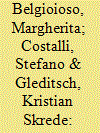

|
|
|
|
|
| Summary/Abstract |
Fringe terrorism is common during nonviolent campaigns. We examine how this can modify the strategic environment between dissident groups and the state in ways that present both challenges and opportunities to moderate factions. Terrorism is intended to promote violent escalation in a conflict, but we argue that fringe terrorist activities in a nonviolent campaign under certain conditions can induce an advantage for well-organized moderate factions. The risk of escalation following terrorism can give the government more incentives to offer concessions to moderate campaign leaders if the movement can credibly prevent armed escalation. The ability to control and prevent violence is more likely when nonviolent movements have a hierarchical structure and a centralized leadership, as such campaigns are better able to prevent shifts by supporters towards violent fringes. Using new data on terrorist attacks by factions sharing the same overall objectives as ongoing nonviolent campaigns, we show that nonviolent campaigns are more likely to see substantial gains in spite of fringe terrorist activities when a movement has a hierarchical structure and a centralized leadership.
|
|
|
|
|
|
|
|
|
|
|
|
|
|
|
|
| 2 |
ID:
164556
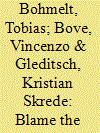

|
|
|
|
|
| Summary/Abstract |
Existing research argues that refugee inflows may increase the risk of domestic conflict, particularly civil war that, by definition, involves the state as an actor. However, many of the postulated mechanisms linking refugees to a higher risk of such conflict pertain to tensions with locals, which do not necessarily involve any grievances against government authorities. We contend that it is more likely to identify an association between refugees and non-state actor violence, that is, armed violence between organized non-state groups, neither of which pertains to the state. We also claim that the extent to which refugees are associated with a higher likelihood of non-state conflict depends on the capacity of governments to manage and mitigate risks. We report evidence that refugee populations can be linked to an increased risk of non-state conflict, as well as for a mitigating effect of state capacity on the risk of non-state conflicts in the presence of refugees. We do not find a clear effect of refugee populations on civil war, suggesting that the link depends on existing conflict cleavages relevant to mobilizing refugees or locals. Our research helps to shed light on the relevant security consequences of managing refugee populations. Despite the common arguments portraying refugees as security risks in developed countries, the risk of non-state conflict applies primarily to weak states that have been forced to shoulder a disproportionate burden in hosting refugees.
|
|
|
|
|
|
|
|
|
|
|
|
|
|
|
|
| 3 |
ID:
053514
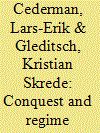

|
|
|
| 4 |
ID:
128874
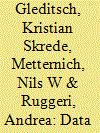

|
|
|
|
|
| Publication |
2014.
|
| Summary/Abstract |
We highlight how efforts to collect systematic data on conflict have helped foster progress in peace and conflict research. The Journal of Peace Research has played a key role in these developments, and has become a leading outlet for the new wave of disaggregated conflict data. We survey progress in the development of conflict data and how this interacts with theory development and progress in research, drawing specifically on examples from the move towards a greater focus on disaggregation and agency in conflict research. We focus on disaggregation in three specific dimensions, namely the resolution of conflict data, agency in conflict data, and the specific strategies used in conflict, and we also discuss new efforts to study conflict processes beyond the use of violence. We look ahead to new challenges in conflict research and how data developments and the emergence of 'big data' push us to think harder about types of conflict, agency, and the 'right' level of aggregation for querying data and evaluating specific theories.
|
|
|
|
|
|
|
|
|
|
|
|
|
|
|
|
| 5 |
ID:
075223
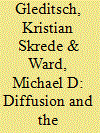

|
|
|
|
|
| Publication |
2006.
|
| Summary/Abstract |
Democracy does not evolve sui generis. The spatial clustering in democracy and transitions suggests that international factors play a prominent role in forging democracies as well as influencing their durability. We argue that democracy often comes about as a result of changes in the relative power of important actors and groups as well as their evaluations of particular institutions, both of which are often influenced by forces outside the country in question. The scope and extent of connections with other democratic countries in a region can strengthen support for democratic reform and help sustain institutions in transitional democracies. Results from a transition model demonstrate that international factors can exert a strong influence on the prospects for transitions to democracy, and the spatial clustering in democracy and transitions cannot adequately be explained by the hypothesized domestic social requisites of individual countries.
|
|
|
|
|
|
|
|
|
|
|
|
|
|
|
|
| 6 |
ID:
112511
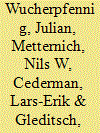

|
|
|
|
|
| Publication |
2012.
|
| Summary/Abstract |
Previous research has focused primarily on how ethnicity may trigger civil war, and its effect on conflict duration remains disputed. Rather than treating conflict as a direct consequence of ethnic cleavages, the authors argue that ethnicity per se does not affect civil war duration. Instead, its effect depends on its relationship to political institutions. They employ a dyadic approach that emphasizes the political context in which both government leaders and nonstate challengers can capitalize on the ascriptive nature of ethnicity. They show that although states can initially benefit from politicizing ethnic relations, once violent conflict breaks out, such policies may backfire on the government and make it difficult for incumbent governments to accept settlements that could terminate conflicts. Past policies of ethnic exclusion also benefit rebel organizations fighting the government, since the resulting grievances increase collective group solidarity and render individual fighters more cost tolerant. Using a new data set that codes the nexus between rebel organizations and ethnic groups, as well as information on ethnopolitical exclusion, the authors find considerable support for their propositions.
|
|
|
|
|
|
|
|
|
|
|
|
|
|
|
|
| 7 |
ID:
088896
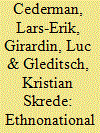

|
|
|
|
|
| Publication |
2009.
|
| Summary/Abstract |
Although the case-based literature suggests that kin groups are prominent in ethnonationalist conflicts, quantitative studies of civil war onset have both overaggregated and underaggregated the role of ethnicity, by looking at civil war at the country level instead of among specific groups and by treating individual countries as closed units, ignoring groups' transnational links. In this article the authors integrate transnational links into a dyadic perspective on conflict between marginalized ethnic groups and governments. They argue that transnational links can increase the risk of conflict as transnational kin support can facilitate insurgencies and are difficult for governments to target or deter. The empirical analysis, using new geocoded data on ethnic groups on a transnational basis, indicates that the risk of conflict is high when large, excluded ethnic groups have transnational kin in neighboring countries, and it provides strong support for the authors' propositions on the importance of transnational ties in ethnonationalist conflict.
|
|
|
|
|
|
|
|
|
|
|
|
|
|
|
|
| 8 |
ID:
065789
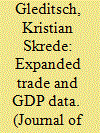

|
|
|
| 9 |
ID:
107533
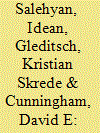

|
|
|
|
|
| Publication |
2011.
|
| Summary/Abstract |
Many rebel organizations receive significant assistance from external governments, yet the reasons why some rebels attract foreign support while others do not is poorly understood. We analyze factors determining external support for insurgent groups from a principal-agent perspective. We focus on both the supply side, that is, when states are willing to support insurgent groups in other states, and the demand side, that is, when groups are willing to accept such support, with the conditions that this may entail. We test our hypotheses using new disaggregated data on insurgent groups and foreign support. Our results indicate that external rebel support is influenced by characteristics of the rebel group as well as linkages between rebel groups and actors in other countries. More specifically, we find that external support is more likely for moderately strong groups where support is more likely to be offered and accepted, in the presence of transnational constituencies, international rivalries, and when the government receives foreign support.
|
|
|
|
|
|
|
|
|
|
|
|
|
|
|
|
| 10 |
ID:
082932
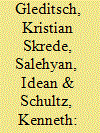

|
|
|
|
|
| Publication |
2008.
|
| Summary/Abstract |
Although research on conflict has tended to separately study interstate conflict and civil war, states experiencing civil wars are substantially more likely to become involved in militarized disputes with other states. Scholars have typically focused on opportunistic attacks or diversionary wars to explain this domestic-international conflict nexus. The authors argue that international disputes that coincide with civil wars are more often directly tied to the issues surrounding the civil war and emphasize intervention, externalization, and unintended spillover effects from internal conflict as important sources of international friction. They empirically demonstrate that civil wars substantially increase the probability of disputes between states. An analysis of conflict narratives shows that the increased risk of interstate conflict associated with civil wars is primarily driven by states' efforts to affect the outcome of the civil war through strategies of intervention and externalization and not by an increase in conflicts over unrelated issues.
|
|
|
|
|
|
|
|
|
|
|
|
|
|
|
|
| 11 |
ID:
121787
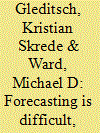

|
|
|
|
|
| Publication |
2013.
|
| Summary/Abstract |
Prediction is an important goal in the study of international conflict, but a large body of research has found that existing statistical models generally have disappointing predictive abilities. We show that most efforts build on models unlikely to be helpful for prediction. Many models essentially ignore the origins of conflict; studies look either at invariant structural features believed to affect the opportunities of conflict, or at factors that are believed to reduce the baseline risk of conflict, without attempting to identify the potential motivations and contentious issues over which conflicts typically arise. Researchers that have considered how contentious issues may motivate conflict and how these can be managed, using the Issues Correlates of War (ICOW) data, have not considered how these features may inform prediction. We assess the risk of dyadic interstate conflict based on the presence of specific contentious issues and conflict management events that may change the conflict potential of these contentious issues. We evaluate to what extent incorporating contentious issues and conflict management can help improve out-of-sample forecasting, as well as advance our understanding of conflict dynamics. Our results provide strong support for the idea that taking into account contentious issues can inform and improve out-of-sample forecasting.
|
|
|
|
|
|
|
|
|
|
|
|
|
|
|
|
| 12 |
ID:
120773
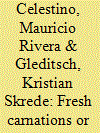

|
|
|
|
|
| Publication |
2013.
|
| Summary/Abstract |
Whereas optimists see the so-called Arab Spring as similar to the revolutions of 1989, and likely to bring about democratic rule, skeptics fear that protest bringing down dictators may simply give way to new dictatorships, as in the Iranian revolution. Existing research on transitions has largely neglected the role of protest and direct action in destabilizing autocracies and promoting democracy. We argue that protest and direct action can promote transitions in autocracies, and that the mode of direct action, that is, whether violent or nonviolent, has a major impact on the prospects for autocratic survival and democracy. We present empirical results supporting our claim that nonviolent protests substantially increase the likelihood of transitions to democracy, especially under favorable international environments, while violent direct action is less effective in undermining autocracies overall, and makes transitions to new autocracies relatively more likely.
|
|
|
|
|
|
|
|
|
|
|
|
|
|
|
|
| 13 |
ID:
180669
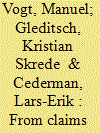

|
|
|
|
|
| Summary/Abstract |
Do radical political demands increase the risk of ethnic civil conflict? And why do ethnic movements make radical demands in the first place? We contend that when movements are fragmented, individual organizations use far-reaching claims relative to the status quo to attract attention from the government, boost intra-organizational discipline, and outbid rivals. Yet, such radical claims also increase the risk of conflict escalation. We test our arguments at both the ethnic group and organizational levels, using a new dataset on ethno-political organizations and their political demands. Our results show that the scope of demands increases the more organizations exist within an ethnic movement and that radical demands increase the risk of civil conflict onset. This effect is specific to the dyadic government-movement interaction, irrespective of other ethnic groups in the country. Moreover, at the organizational level, radicalization in demands increases the likelihood that an organization becomes engaged in civil conflict.
|
|
|
|
|
|
|
|
|
|
|
|
|
|
|
|
| 14 |
ID:
192870
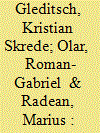

|
|
|
|
|
| Summary/Abstract |
We examine how popular dissent affects the likelihood that political leaders lose power, distinguishing between types of dissent in terms of nonviolent/violent primary tactics as well as the level of individual participation. We posit that protests threaten leaders both directly through the governance costs of citizen non-compliance, and indirectly through the increased risk of elite defections in the ruling coalition. In a series of propositions we detail how the type of dissent and the magnitude of participation influence the odds of leaders surviving in office. We argue that mass nonviolent challenges tend to be more threatening to a leader’s rule than violent dissent, given the characteristics of movements likely to choose nonviolent tactics. Moreover, the effectiveness of the challenge increases in the scale and size of the dissident campaign, and movements that can mobilize larger numbers have a comparative advantage in nonviolent tactics. Employing data on political leaders’ tenure and dissident campaign characteristics, we provide evidence consistent with our expectations.
|
|
|
|
|
|
|
|
|
|
|
|
|
|
|
|
| 15 |
ID:
110540


|
|
|
|
|
| Publication |
2011.
|
| Summary/Abstract |
Contemporary research on civil war has largely dismissed the role of political and economic grievances, focusing instead on opportunities for conflict. However, these strong claims rest on questionable theoretical and empirical grounds. Whereas scholars have examined primarily the relationship between individual inequality and conflict, we argue that horizontal inequalities between politically relevant ethnic groups and states at large can promote ethnonationalist conflict. Extending the empirical scope to the entire world, this article introduces a new spatial method that combines our newly geocoded data on ethnic groups' settlement areas with spatial wealth estimates. Based on these methodological advances, we find that, in highly unequal societies, both rich and poor groups fight more often than those groups whose wealth lies closer to the country average. Our results remain robust to a number of alternative sample definitions and specifications.
|
|
|
|
|
|
|
|
|
|
|
|
|
|
|
|
| 16 |
ID:
069082
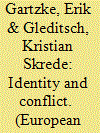

|
|
|
| 17 |
ID:
112777
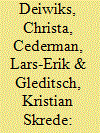

|
|
|
|
|
| Publication |
2012.
|
| Summary/Abstract |
Case study evidence suggests that inequality between regions in federations affects the risk of secessionist conflict. However, the conventional quantitative literature on civil war has found little support for a link between economic inequality and civil war. We argue that this seeming discrepancy in part stems from differences in the conceptualization of inequality and its operationalization, which has focused on individual-level wealth differences. In contrast, we investigate regional-level inequality, which is more readily applicable to understanding possible incentives for internal conflict. We adopt a spatial approach, based on new geo-coded data on administrative units in 31 federal states between 1991 and 2005, economic wealth, and ethnic settlements, and demonstrate strong evidence that regional inequality affects the risk of secessionist conflict. The results indicate that in highly unequal federations, both relatively developed and underdeveloped regions are indeed more likely to be involved in secessionist conflict than regions close to the country average. In addition, we provide evidence that exclusion from central state power as well as ethnic groups' access to regional institutions are associated with an increased risk for secessionist conflict. The findings on inequality remain robust even when controlling for other confounding factors such as country GDP, population and war history.
|
|
|
|
|
|
|
|
|
|
|
|
|
|
|
|
| 18 |
ID:
090987
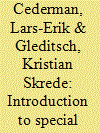

|
|
|
|
|
| Publication |
2009.
|
| Summary/Abstract |
We introduce the contributions to this special issue on "Disaggregating Civil War." We review the problems arising from excessive aggregation in studies of civil war, and outline how disaggregation promises to provide better insights into the causes and dynamics of civil wars, using the articles in this special issue as examples. We comment on the issue of the appropriate level of disaggregation, lessons learned from these articles, and issues for further research.
We introduce the contributions to this special issue on "Disaggregating Civil War." We review the problems arising from excessive aggregation in studies of civil war, and outline how disaggregation promises to provide better insights into the causes
|
|
|
|
|
|
|
|
|
|
|
|
|
|
|
|
| 19 |
ID:
091000
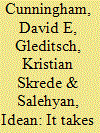

|
|
|
|
|
| Publication |
2009.
|
| Summary/Abstract |
Theories of conflict emphasize dyadic interaction, yet existing empirical studies of civil war focus largely on state attributes and pay little attention to nonstate antagonists. We recast civil war in a dyadic perspective, and consider how nonstate actor attributes and their relationship to the state influence conflict dynamics. We argue that strong rebels, who pose a military challenge to the government, are likely to lead to short wars and concessions. Conflicts where rebels seem weak can become prolonged if rebels can operate in the periphery so as to defy a government victory yet are not strong enough to extract concessions. Conflicts should be shorter when potential insurgents can rely on alternative political means to violence. We examine these hypotheses in a dyadic analysis of civil war duration and outcomes, using new data on nonstate actors and conflict attributes, finding support for many of our conjectures.
|
|
|
|
|
|
|
|
|
|
|
|
|
|
|
|
| 20 |
ID:
107971
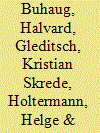

|
|
|
|
|
| Publication |
2011.
|
| Summary/Abstract |
Income varies considerably within countries and the locations where conflicts emerge are rarely typical or representative for states at large. Yet, most research on conflict has only examined national income averages and neglected spatial variation. The authors argue that civil conflicts are more likely to erupt in areas with low absolute income, even if a country's gross domestic product (GDP) per capita is not necessarily low, and in areas with large deviations from national averages. The authors test these hypotheses empirically using spatially disaggregated data on the location of conflict outbreaks and per capita income estimates. The authors find that areas with absolute poverty indeed see more outbreaks of conflict, and they find some evidence that inequality increases the risk of conflict. Subnational information can improve on conventional country-based measures and help our understanding of how local features and variation can give rise to mobilization and violence.
|
|
|
|
|
|
|
|
|
|
|
|
|
|
|
|
|
|
|
|
|